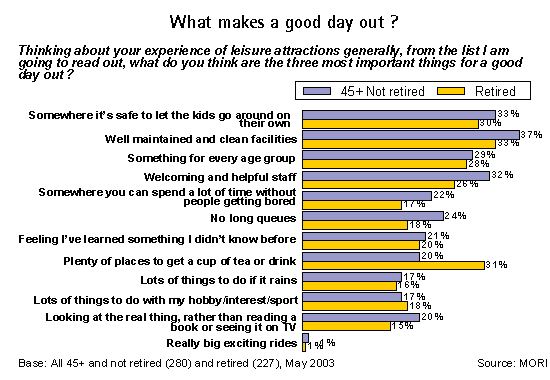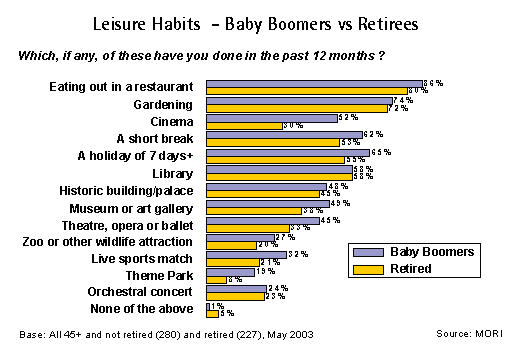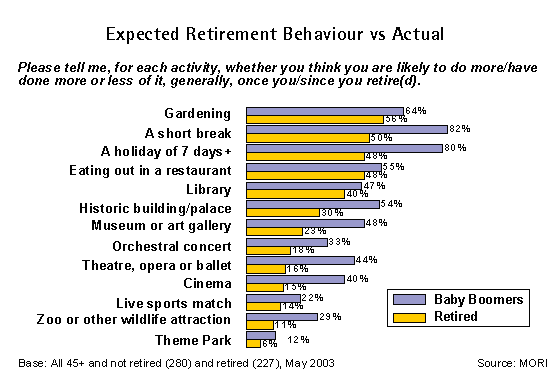Grey Power / The Grey Ahead
"At every stage of their lives, members of the Baby Boom generation have been at the forefront of radical social, economic and political changes: within the family, within education, within the workplace and beyond"
In recent years, many people have begun to notice that the UK's population profile is shifting towards those of a more advanced age. By 2007, or thereabouts, there will be just as many people aged 65+ as there are under 16s. Apart from signalling a need for more candles on every birthday cake, though, the implications of this shift remain relatively unclear. Within the leisure sector, in particular, few people can say with any degree of certainty what impact an older population will have on their business.
One way of looking at prospects for the sector is to consider how attitudes and behaviour patterns differ between those who are currently retired, and those who are approaching retirement. We know, for example, that people adapt their behaviour as they get older, rather than simply adopting the behaviours of the previous generation. We probably don't expect most members of the current 'Generation X' to be bungy-jumping and mountain biking in their 70s, but it would be equally surprising if the Baby Boomer generation (defined, for the sake of this article, as those aged 45+ but not yet retired) all take up crochet, and invest in tartan shopping trolleys within the next few years. There's every likelihood, therefore, that the things that interest our Baby Boomer generation now will continue to get them excited as they grow older.
People are retiring earlier. Looking at cross sections of the British population, 16% of those aged 55 are currently retired. This rises to 55% by the age of 60. That's a lot of people - in many cases, fairly healthy and relatively well-off - with time on their hands. What's more, by the age of 55, just 8% of the population still have children living in their household, whereas at 45, 47% of households contain children. So over this period, people are experiencing a real sense of freedom, as the day to day responsibilities placed on them in bringing up children ease away. Expectations are increasing all the time. This generation has become used to the idea of foreign travel, having access to new technology, paying a premium for top class products and services etc. It would appear that they are going to bring a whole new set of values with them into retirement.
Comparing Baby Boomers' and retirees' attitudes towards leisure is, in fact, quite eye-opening. When asked about which factors make up a good day out, their responses are very similar. In our recent research, the only significant difference between Baby Boomers and retirees is that the latter group are more inclined to stress the importance of there being plenty of places to get a cup of tea!

But what about their leisure behaviour? Baby Boomers are far more active - right across the leisure spectrum - than their retired counterparts. They are significantly more likely to go to the cinema, to take holidays, to visit museums, theatres, sports matches and theme parks. That isn't to say, though, that retirees are simply sitting at home watching Countdown. Four in five eat out in restaurants, more than half take holidays, and 45% visit historic properties. In fact, one in twelve of those who are currently retired claim to have visited a theme park in the last year.

"Nearly 75% of retirees would rather spend their cash on having fun in their later years than put towards their offspring's inheritance" Eagle Star Press Release 2002So already we are seeing a move towards a more hedonistic approach to life among retirees - the so-called 'SKIN' group ("Spending Kids Inheritance Now"). Our data suggest that this trend is only going to be magnified. Baby Boomers expect to carry on taking part in more leisure activities as they get older. It would appear that the retirement envisioned by the majority of them will revolve around leisure and culture.

The most significant growth area would appear to be in travel. Four in five Baby Boomers expect to take more holidays and short breaks after they retire. (Around half of current retirees say that this tallies with their actual behaviour since leaving work.) This does not mean, of course, that people are expecting to spend all their money on travel, and will have none left for other leisure activities - after all, what happens when they get to their holiday destination? It does have an impact on marketing, though:
- traditional visitors/users will be spending large amounts of their free time (and money) on travelling further afield, so leisure providers will have to look harder for custom.
- there will be influxes of people visiting from further afield, so traditional forms of marketing may pass them by. The internet would appear to be the ideal medium for gaining recognition, and encouraging people to visit. (Older people already spend longer on-line, visit more sites, and have higher dwell time.)
Other areas where there appears to be significant growth on the horizon include: Historic buildings and palaces
- Heritage is a big growth area at present, thanks, in part, to the recent phenomenal success of factual historical TV programmes. Assuming that heritage attractions can provide a 'quality' experience that satisfies a more demanding audience (and, of course, supplies plenty of places to get a cup of tea), the future would appear to be bright. One cloud on the horizon, though, is transport - car ownership drops off rapidly once people pass the age of 70, and as many historic buildings are set in rural locations, there may be a need to consider alternative approaches to attracting people on-site.
Theatre, opera and ballet
- These appear to be experiencing something of a renaissance at present. As mainstream cinema continues to cater primarily for the 16-34 age group, the opportunities for the theatrical sector to fill entertainment gaps are widening.
Museums and galleries
- On the surface, these appear to be set for a growth in visit numbers. It is interesting to note, though, how rapidly the intention to visit museums drops off as people get older - the 45-54 age group are a great deal more likely than those aged 55+ to say they are planning to visit museums and galleries post-retirement.
These results are based on a snapshot of current opinions and attitudes. Only time will tell if our Baby Boomer generation will turn out to do all the things they claim they are planning to do. One thing is clear, though. Given their history of social activity, it is unlikely that they will decide to grow old gracefully and spend all their time in the garden. Baby boomers are going to make very active, and very demanding retirees over the next few years, so be prepared! Andy Martin is a Research Director, and Head of Leisure Research at MORI. For more details, he can be contacted on 020-7347 3000



